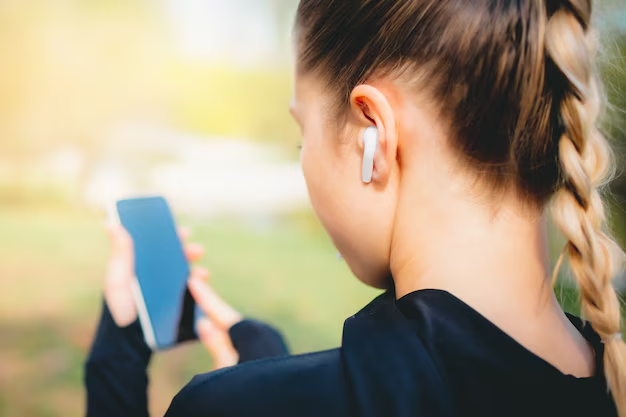Your Guide to Are Airpods Bad For Your Ears
What You Get:
Free Guide
Free, helpful information about Hearing Aid FAQ and related Are Airpods Bad For Your Ears topics.
Helpful Information
Get clear and easy-to-understand details about Are Airpods Bad For Your Ears topics and resources.
Personalized Offers
Answer a few optional questions to receive offers or information related to Hearing Aid FAQ. The survey is optional and not required to access your free guide.
Are AirPods Harming Your Ears? A Comprehensive Analysis
AirPods and other wireless earbuds have become ubiquitous accessories in our daily lives. They’ve redefined how we engage with music, podcasts, and communication. But with their rise in popularity also comes a wave of concerns about the potential impact on hearing health. Let's dive deep into whether using AirPods could be detrimental to your ears, exploring the topic from various angles to provide a balanced perspective.
Understanding How AirPods Work
AirPods are nifty little devices, but to understand potential risks, it’s vital to grasp how they function. These wireless earbuds are designed to sit in the ear canal and deliver sound from your device via Bluetooth. Their technology allows for noise cancellation features, touch controls, and more, making them appealing for both functionality and convenience.
The Anatomy of Your Ear and Earbuds
To comprehend potential harm, it's helpful to understand the basic anatomy involved:
- Outer Ear: Where AirPods rest, channeling sound down to the canal.
- Middle Ear: Amplifies vibrations from the eardrum.
- Inner Ear: Converts vibrations into signals for the brain.
Given their snug fit, AirPods deliver sound directly into the ear canal, creating a unique audio environment. It’s crucial to consider whether this setup has any risks associated with prolonged exposure.
Are AirPods Bad for Your Hearing?
Concerns regarding AirPods center around volume level and duration of use. Listening at high volumes for extended periods can potentially damage your inner ear structures. This applies not just to AirPods but to any headphones. Here’s what you should know:
Noise-Induced Hearing Loss
One of the primary risks associated with earbud use is noise-induced hearing loss (NIHL). This occurs when exposure to increased sound levels causes damage to the hair cells in the cochlea, responsible for transmitting auditory signals to the brain.
- Volume and Duration: Listening at higher volumes increases risk. Even volumes that may seem moderate or harmless can be dangerous over prolonged periods.
- Safe Listening Practices: Many experts suggest adopting the "60/60 rule" – keep volume levels at 60% and limit listening time to 60 minutes at a time.
Impact of Noise Isolation
AirPods provide some level of noise isolation due to their design, which can be a double-edged sword:
- Favorable: Reduces need to crank up the volume in noisy environments.
- Unfavorable: Can trap sound, leading to higher volumes than necessary.
Health Effects Beyond Hearing
There’s more to consider than just auditory risks. Constant use of devices like AirPods can influence various aspects of health:
Ear and Skin Health
Frequent AirPods usage can impact ear health in unexpected ways:
- Ear Infections: Prolonged use can trap heat and moisture, creating a breeding ground for bacteria.
- Skin Irritation: Some people may experience allergic reactions or irritation from prolonged wearing.
Mental and Emotional Health
Though not directly linked to AirPods, excessive usage can contribute to broader health implications:
- Hearing Fatigue: Continuous audio input can lead to mental fatigue.
- Social Isolation: Always having earbuds in can limit interaction with your surroundings and reduce social experiences.
Adopting Safe Listening Habits
As we explore potential impacts, it’s important to acknowledge how users can mitigate risks associated with AirPods. Here are some best practices to protect your ears:
Practical Tips for Safer Use
- Moderate Volume Levels: Avoid max volume; aim for the lowest volume that still provides a clear listening experience.
- Regular Breaks: Allowing your ears time to rest is essential. Use breaks as a chance to step back into your acoustic environment.
- Ensure a Good Fit: Proper fitting AirPods help reduce the need for excessive volume.
- Sanitation: Regularly clean your earbuds to prevent infections.
Alternative Listening Strategies
Consider varying your audio solutions to reduce dependency on in-ear devices, including:
- Over-Ear Headphones: These can provide great sound quality with potentially less risk at lower volumes.
- Open-Air Speakers: Using speakers instead can allow you to enjoy sound without direct impact on the ear canal.
Summary: AirPods and Your Ear Health 🔍
To summarize what we've explored, here’s a quick guide to consider:
- Limit Volume Levels 📉: Adhere to the 60/60 rule to protect hearing.
- Take Breaks ⏱️: Allow ears to rest by limiting continuous use.
- Clean Regularly 🧼: Prevent moisture buildup and bacteria issues.
By understanding potential risks and adopting mindful listening habits, you can enjoy technology like AirPods without compromising ear health. While they offer convenience and high-quality sound, mindful usage is key to preventing potential complications down the line. Remember, awareness and moderation will go a long way in ensuring these devices remain a safe part of your audio experience.
What You Get:
Free Hearing Aid FAQ Guide
Free, helpful information about Are Airpods Bad For Your Ears and related resources.

Helpful Information
Get clear, easy-to-understand details about Are Airpods Bad For Your Ears topics.

Optional Personalized Offers
Answer a few optional questions to see offers or information related to Hearing Aid FAQ. Participation is not required to get your free guide.


Discover More
- a Plus Hearing Aid Centers
- a Real Pain Showtimes Near Centerville
- Are Apple Second Generation Airpods Hearing Aids
- Are Audien Hearing Aids Just Amplifiers
- Are Costco Hearing Aids As Good As Others
- Are Costco Hearing Aids Good
- Are Hearing Aid Domes Interchangeable
- Are Hearing Aid Subscriptions Worth It
- Are Hearing Aid Tax Deductible
- Are Hearing Aids a Tax Deduction
